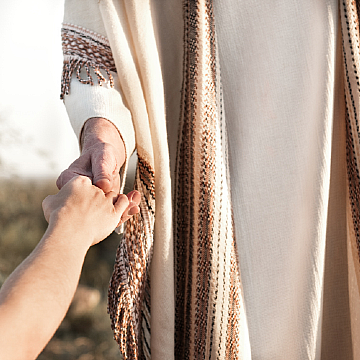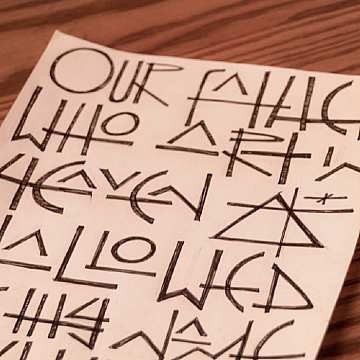For Members & Friends
My MPCEPC
Introduction
Oftentimes when we talk about Jesus and who He is, we look at His time on earth in a very practical and tangible way. That’s what we read about in the Bible, after all. His time on Earth and His relationships with people. He is seen as a friend: accessible to us in a way that gives us a chance at developing a relationship with Him. Yet Jesus is more than just turning water into wine. In this month’s blog, we’re going to talk about Jesus’ three different offices and one divine goal: Prophet, Priest, King, and Savior. Similar to our series on the Holy Trinity, the topic is not easily explained and contains many nuances; however, we’ll cover the basics to give you an understanding of not only who Jesus is, but also what He is.Jesus as Prophet
Before we can understand Jesus as Prophet, let’s examine the terminology. Prophet is defined as a person regarded as an inspired teacher or proclaimer of the will of God. They are often regarded as being in contact with God and are said to speak on behalf of that being, serving as an intermediary with humanity and the divine. If we look at the Bible, particularly in the Old Testament, we see a number of prophets who did, in fact, proclaim God’s truth to others and reveal God’s plans for the future. We see their interactions with God described in various ways, but what they all have in common is that acted as the “middle-man” between God and humanity, teaching, showing, and serving God. You can take a look at this introduction of Old Testament Prophets if you want to dive more into their lives and prophecies.Yet why is Jesus THE Prophet? Didn’t He do the same things as the other prophets in the Bible? Yes and No. He taught people the truth about God, and He foretold the future, like other prophets. Yet the other prophets acted as intermediaries between God and humanity. Jesus was different; He was (and is) God. There was no in-between. When Jesus came to Earth, He was the Word of God. Rather than have messages be sent from God through humans like a game of telephone where the message could get garbled in our imperfectness, God sent Jesus to be THE Prophet that would guide us in how we should live, how we should love, and what comes next.
We won’t dive into the relationship between Jesus and God and the Holy Spirit here (see our series on the Trinity for an exploration of that topic), but we see throughout Scripture that Jesus taught the Word of God with certainty and conviction. In Mark 1:22, after Jesus went to the synagogue and began to teach, Mark writes, “the people were amazed at his teaching, because he taught them as one who had authority, not as the teachers of the law.” In the following chapters of Mark, we see a recounting of Jesus healing many, of people coming to Him for healing and learning, and even predicting His own death. He fulfills the office of Prophet in these actions and many more.
Jesus as Priest
Similar to how a prophet speaks to humanity on behalf of God, priests also acted as an intermediary or mediator between humans and God. Priests, in the Old Testament, offered sacrifices on behalf of the people. Each year, on the Day of Atonement, the High Priest would go to the Holy Place and offer a blood sacrifice to cleanse the people of their sins. We see this day mentioned in Leviticus 16, particularly summarized in verses 32-34: “‘The priest who is anointed and ordained to succeed his father as high priest is to make atonement. He is to put on the sacred linen garments and make atonement for the Most Holy Place, for the tent of meeting and the altar, and for the priests and all the members of the community. This is to be a lasting ordinance for you: Atonement is to be made once a year for all the sins of the Israelites.’ And it was done, as the Lord commanded Moses.”Knowing that Jesus was a prophet, which already establishes Him as a mediator between humanity and God, makes the connection to Jesus as Priest an easy idea to understand. Jesus not only spoke to us about God’s plans for us (as prophet), but He also offered sacrifice (as priest) to cleanse us of our sins, just as an Old Testament priest would have. The difference between those Old Testament priests and Jesus is the sacrifice that was made on our behalf. Rather than offering the blood of goats and calves, Jesus offered His own blood for our salvation. We read in Hebrews 5:7, “During the days of Jesus’ life on earth, he offered up prayers and petitions with fervent cries and tears to the one who could save him from death, and he was heard because of his reverent submission. Son though he was, he learned obedience from what he suffered and, once made perfect, he became the source of eternal salvation for all who obey him and was designated by God to be high priest in the order of Melchizedek.”
God, essentially, sent His son (part of Himself, Jesus Christ… again, see our Trinity series) to save us. The sacrifices offered before Jesus were imperfect. In Hebrews 10:8-12, we read how Jesus set aside the old rules of sacrifice from Old Testament priests on Atonement Day: “First he said, ‘Sacrifices and offerings, burnt offerings and sin offerings you did not desire, nor were you pleased with them’—though they were offered in accordance with the law.” These old sacrifices were only a stop-gap measure in the grand plan. What we needed was the perfect sacrifice to wipe the slate clean. And God gave us His own perfection as a sacrifice for us so that we could be saved, but just for a day or a year, but forever. Continuing in Hebrews 10:8-12, the writer tells us of Jesus, who said, “‘Here I am, I have come to do your will.’ [Jesus] sets aside the first [rules of sacrifices] to establish the second. And by that will, we have been made holy through the sacrifice of the body of Jesus Christ once for all. Day after day every priest stands and performs his religious duties; again and again he offers the same sacrifices, which can never take away sins. But when this priest had offered for all time one sacrifice for sins, he sat down at the right hand of God.”
Jesus as King
Understanding the connection between prophet and priest seems fairly simple, but making the connection to King takes a bit more digging and a little more context. Let’s start, once again, with a definition. A king is defined as the male ruler of an independent state, especially one who inherits the position by right of birth. Pretty easy to understand definition. Now, let’s look at what we know about God: He is the creator of all the heavens and the earth. Understanding how human kings and succession has worked in the past, we can grasp the basic context of God the Father is the King and His son, Jesus, is His anointed (or chosen, i.e. the office of King is given). Yet God and Jesus are one and the same, thus Jesus is King.Yes, this is kind of a simplistic answer and Jesus is King for so many other reasons, but this gives us at least some groundwork to build on. Let’s dig in a bit deeper.
God never wanted us to have a human king, yet He realized that the people had rejected God as their king, so He allowed the people to have what they asked for and to experience the results of imperfect rulers. In 1 Samuel 8:7, God says, “‘Listen to the voice of the people in regard to all that they say to you, for they have not rejected you, but they have rejected Me from being king over them.’” Even though God understood that humankind would never be perfect in ruling over one another, He allowed them to learn from their own mistakes—and he provided the way to restoration by giving a lineage of kings that would ultimately lead to Jesus. God established King David as the house that would lead to our salvation. In Luke 1:31-33, we read how the angel Gabriel told Mary of the son she would bear (a descendant of King David) and his inheritance as the successor to the line of kings:
And behold, you will conceive in your womb and bear a son, and you shall name Him Jesus. He will be great and will be called the Son of the Most High; and the Lord God will give Him the throne of His father David; and He will reign over the house of Jacob forever, and His kingdom will have no end
So, we can see that not only was Jesus the son of God, THE King of creation, but Jesus also traces lineage to the House of David, a line of human kings. Jesus is the rightful ruler of both the heavens and the earth, as we read in Matthew 28:18-20: “Jesus came to them and said, ‘All authority in heaven and on earth has been given to me. Therefore go and make disciples of all nations, baptizing them in the name of the Father and of the Son and of the Holy Spirit, and teaching them to obey everything I have commanded you. And surely I am with you always, to the very end of the age.’”
Jesus as Savior
Jesus holds all of the offices of Prophet, Priest, and King, yet He also holds another place for us. We touched on this briefly as we discussed Jesus and Priest, offering Himself as the ultimate sacrifice to cleanse us of sin. Understanding the action of sacrifice is fairly straightforward: we’re looking at facts, after all. Yet understanding the significance takes, again, more digging into the details.Each of the offices Jesus holds—Prophet, Priest, King—were, in the Old Testament, offices where those who were chosen for them were anointed. The process of anointing not only set those chosen apart from the rest of humanity, it also was a symbol of purification, of making something holy (consecration), and was done in connection with specific blessings given to the individual. When we look at the anointment of Jesus, He was anointed twice during his time on earth. Peter, one of Jesus’ Disciples, taught that Jesus’ receiving the Holy Spirit after His baptism was representative of an anointing.
In Acts 10:35-36, we see Peter teaching, “You know what has happened throughout the province of Judea, beginning in Galilee after the baptism that John preached—how God anointed Jesus of Nazareth with the Holy Spirit and power, and how he went around doing good and healing all who were under the power of the devil, because God was with him.”
The second anointment of Jesus in his time on earth is found in John 12:3-8: “then Mary took about a pint of pure nard, an expensive perfume; she poured it on Jesus’ feet and wiped his feet with her hair. And the house was filled with the fragrance of the perfume. But one of his disciples, Judas Iscariot, who was later to betray him, objected, “Why wasn’t this perfume sold and the money given to the poor? It was worth a year’s wages.” He did not say this because he cared about the poor but because he was a thief; as keeper of the money bag, he used to help himself to what was put into it. ‘Leave her alone,’ Jesus replied. ‘It was intended that she should save this perfume for the day of my burial. You will always have the poor among you, but you will not always have me.’” After this anointment, Jesus went with His Disciples to Jerusalem where he rode at the head of the triumphal procession into the city, with those attending calling Him King.
So, we see the anointment of Jesus gave Him distinction in the three offices he holds, yet the anointment God bestowed on Jesus not of oil, but of the Holy Spirit is what sets Jesus apart as Christ (or the Messiah, meaning Holy One or Savior). Rather than an anointment from a person, this anointment is from God, marking Jesus as God’s chosen, the one to whom God gave the power to heal our brokenness. Jesus is the one who God chose to reconcile us to Him.
How can I get to know Jesus… and more than just the facts?
Understanding facts about Jesus’ life is only part of knowing Him. Accepting, understanding, and exploring Jesus as Prophet, Priest, Savior, and King are how you can truly know Jesus. Start by asking yourself how these roles impact your life and how that impact changes how you live.Francis Chan’s Jesus’s Farewell Message is a great study where you can explore Jesus’ message to His Disciples the night before He died, and His wish for us. You can also explore the Who Is Jesus interactive content on RightNow Media that explores a number of responses from pastors, professors, authors, and ministry leaders. We also want to point you to a basic study called Why Jesus? that is available in adult and youth versions. And if you’re new to the blog or have been reading for a while, we encourage you to Just send us an email with your questions, comments, or just for more information on resources. We’d love to hear from you!



Comments (0)